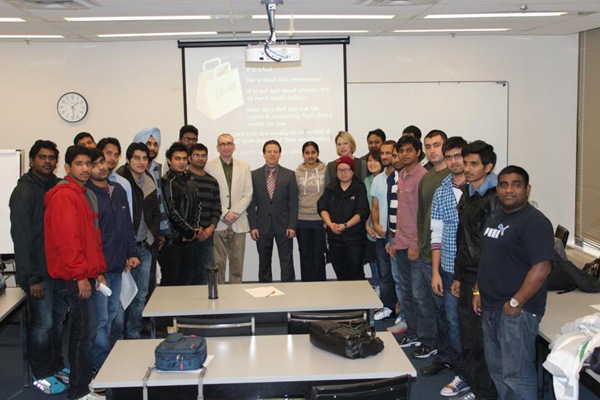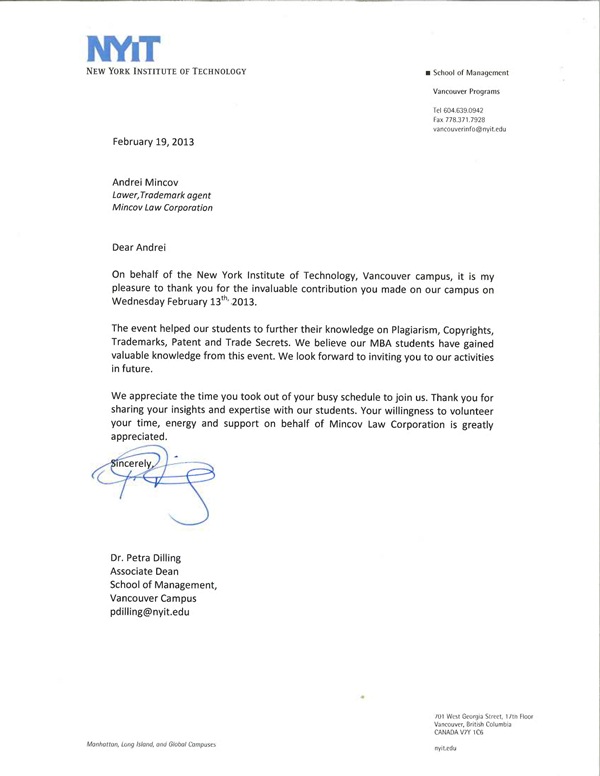Blog
Just hours before I fly off to Dallas for the annual meeting of the International Trademark Association, I have launched the new website for Canadian Trademark Factory™.
The Trademark Factory™ is a service offered by Mincov Law Corporation that allows business owners to register their trademarks at a 100% predictable all-inclusive flat rate with a 100% money-back guarantee.
Please check it out and leave your comments below. I'd love to know what you think!
Mar20th
2013
Often, I get requests to draft a simple agreement whereby the business owner who paid or is about to pay for some content created specifically for that business would own copyright in what they pay for.
Just today, I got a call from an existing client. They hired a videographer to create videos for their business. Now the videographer is claiming that my client does not own copyright in the videos. However surprising this may be to most people, the videographer is correct, at least from the legal standpoint.
Unless there is an assignment of copyright in writing, the copyright remains with the person who created the work, in this case, the videos.
Often, the client’s situation does not justify hiring a lawyer to create a completely customized agreement.
So I decided to share the template that I developed as a result of many years of writing these agreements in different jurisdictions.
If you hired someone to create content for you or you are about to hire someone to create content for you and you don’t have a budget to document the transfer of intellectual property from your contractor to you, you should definitely check out these templates. They may not ideally fit your situation and are not offered as legal advice, but in my experience, they should take care of 90% of the situations that usually arise around such facts.
This is where you can download standard Content Creation and Copyright Assignment templates at a fraction of what it would cost you to have a lawyer draft a customized contract. Check out the previews and see for yourself that the level of details covered in these templates greatly exceeds anything that you can download for free on the Internet.
Hoping that this will be of value to you.
On February 13, 2013, I delivered a seminar on intellectual property at the New York Institute of Technology in Vancouver.
Great to see so many aspiring students with lit-up eyes who came to learn about IP.


It is with great excitement that I would like to announce the launch of the mobile version of the mincovlaw.com website.
After two weeks of on-and-off coding, it now looks that everything works as intended.
If you notice a bug, a glitch or have a suggestion, I would really appreciate if you left your comments below.
Thank you!
| Categories: | Website Updates: | Website UpdatesNew Feature |
The story of people registering domain names, user names, screen names and other internet names confusing with famous trademarks of others is as old as the internet itself.
Historically, ISPs and website operators had done very little to address rights and lawful interests of trademark owners, which resulted in massive litigation costs for the first plaintiffs who needed to reclaim their stake in .COM domain names.
In 1999, ICANN implemented the Uniform Dispute Resolution Policy that gave trademark owners a time- and cost- efficient way to deal with straightforward cases of cybersquatting. UDRP policy and rules, along with supplemental rules of several UDRP providers, such as WIPO and NAF, are sophisticated documents detailing various aspects of substance and procedure.
It may be hard to believe today but Twitter has only been around since 2006. With its revolutionary format, Twitter has now become the platform that allows over 500 million registered users to exchange over 340 million messages a day.
No wonder that it attracted those who wanted to capitalize on somebody else’s goodwill! With the prevalence of Twitter on the web, it was only a matter of time before a trademark owner would find itself unable to register a Twitter handle corresponding with its trademark.
In result, Twitter came up with its Trademark Policy to address such disputes.
Unlike UDRP, Twitter trademark policy is very brief and leaves a lot of discretion to Twitter. The gist of the policy is that if Twitter receives a “report of trademark policy violations from holders of federal or international trademark registrations”, Twitter will review the account and if Twitter finds that there is a clear intent to mislead others or if the account is in fact misleading, then Twitter may suspend the account and release the username for the trademark holder’s active use.
The policy clarifies that Twitter users should not use someone else’s trademarks as usernames, profile names, profile photos, header photos, background images, or otherwise create an association between their Twitter pages and comments and such trademarks. For fan pages, Twitter users are required to include a statement to distinguish their Twitter profile from the real company by adding a disclaimer in the 160-character bio, such as “Unofficial Account”, “Fan Account”, “Not affiliated with…”
The procedure for reporting trademark policy violations is very simple: the interested party must provide the following information: username of the reported account, the trademark owner’s company name, the trademark owner’s twitter account (if there is one), the trademark owner’s website, the trademark, trademark registration number and country of trademark registration.
Interestingly, trademark policy violations can only be sent from an email address of the company owning the trademark. For example, if Apple wanted to reclaim the @ipad username, the trademark policy violation request must have been sent from an username@apple.com. In other words, if Apple wanted to have a lawyer submit the report, Apple would need to set the lawyer with an @apple.com email first.
Unlike the courts and UDRP, Twitter primarily deals with registered trademarks, not common law trademarks. UDRP specifically states that it applies to complainants who have “rights” in a trademark. Twitter trademark policy is a serious limitation to those trademark owners who rely on their unregistered trademarks. Although the policy makes it clear that “a federal or international trademark registration is required”, Twitter makes an exception for unregistered trademarks held by government agencies and non-profit organizations.
The trademark owner must describe confusion that is being created by unauthorized use of the trademark by the twitter handle.
Finally, the trademark owner should choose whether it desires to remove the violating account or transfer the trademarked username to the trademark owner. These two options are in line with UDRP, where the trademark owner may request cancellation of a domain name registration or its transfer to the trademark owner.
Interestingly, the format of the complaint is that of a “trademark policy violation”, not “trademark infringement” as such. This is done in the attempt to shield Twitter from having to resolve each and every dispute between trademark owners and twitter users.
Currently, Twitter usernames are less important for branding compared to domain names, which is probably the reason why there have not been very many court cases and serious disputes around Twitter user names. Time will tell if this is going to change.
Meanwhile, if you are a trademark owner, make sure you use Twitter internal policy if you see someone else use your trademark on their twitter profile.
If you are a Twitter user, make sure you don’t infringe upon trademark rights of others. Remember that just because Twitter has a policy that facilitates the transfer of usernames to trademark owners, does not mean that you cannot be sued for trademark infringement personally.
| Categories: | Intellectual Property: | Trademarks |
Categories:
Intellectual Property:Trademarks
Intellectual Property
Copyright
IP Strategy
TMF Cartoons
New Article
Patents
Domain Names
Internet
Values:
Passion
Integrity
Innovation
Decency
Efficiency
Freedom
Individual Rights
Website Updates:
Website Updates
More Cases Uploaded
New Feature
Tags:
CollectivismPhilosophySmall BusinessNew Copyright ActFair DealingArchive:
March 2016October 2015
September 2015
July 2015
March 2015
August 2015
June 2015
May 2015
April 2015
February 2015
January 2015
December 2014
November 2014
October 2014
August 2014
May 2014
April 2014
March 2014
February 2014
December 2013
November 2013
October 2013
September 2013
August 2013
July 2013
June 2013
May 2013
April 2013
March 2013
February 2013
January 2013
December 2012
November 2012
October 2012
September 2012
August 2012
July 2012
June 2012
May 2012
April 2012
March 2012
February 2012
January 2012
December 2011
